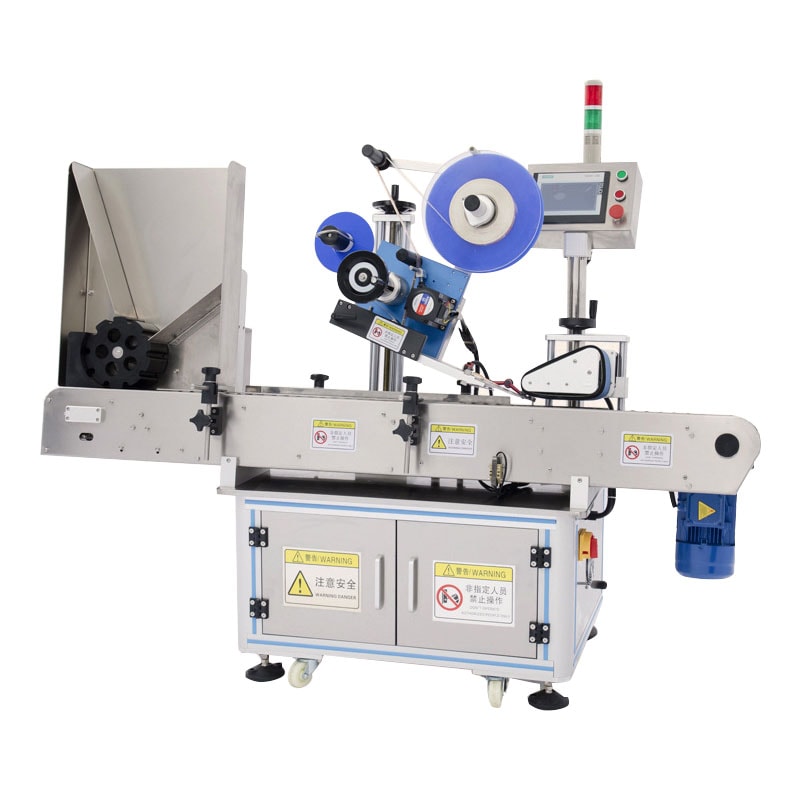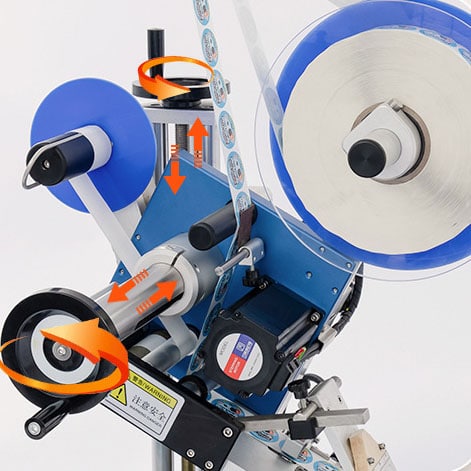Pharmaceutical companies face significant challenges in ensuring proper labeling for compliance and safety. Failure to meet strict labeling standards can lead to severe legal consequences and potential harm to patients. A well-designed pharmaceutical labeling machine can solve these issues by ensuring precision and regulatory compliance.
Yes, labeling machines specifically designed for pharmaceuticals ensure high precision, regulatory compliance, and operational efficiency. These machines handle vials, syringes, and bottles with advanced serialization and tamper-evident features.
Pharmaceutical labeling machines are a vital part of ensuring product safety and traceability in the industry.

What Are Pharmaceutical Labeling Machines?
Pharmaceutical labeling machines are designed specifically to apply labels to various pharmaceutical products such as vials, syringes, and bottles. These machines are built with precision and adaptability in mind to handle the unique requirements of this highly regulated industry. With advanced sensors and tracking mechanisms, they ensure that each product is labeled correctly and complies with industry standards.
Vial and Ampoule Labeling Machines
Vial and ampoule labeling machines are specifically designed for small cylindrical products commonly used in the pharmaceutical industry. These machines operate at high speeds, ensuring that even the smallest products receive accurate and clear labels. They include features such as serialization, which allows manufacturers to track products throughout the supply chain.
Vial labeling machines also include tamper-evident seals that guarantee product integrity. For companies producing injectable drugs, these machines ensure that every label is applied with precision, reducing the risk of labeling errors that could compromise patient safety.
Syringe Labeling Machines
Pre-filled syringes require special handling due to their unique shape. Syringe labeling machines are designed to apply wrap-around or flat labels that adhere perfectly without wrinkling or tearing. These machines can handle various syringe sizes and ensure each label is placed correctly for easy readability by healthcare professionals.
Many syringe labeling machines also integrate barcodes and serialization, ensuring that each syringe is traceable from production through to patient use. This helps prevent mix-ups in healthcare settings and ensures compliance with regulatory requirements.

Importance of Labeling in Pharmaceuticals
Accurate labeling in the pharmaceutical industry is critical for several reasons. Labels provide important information such as dosage instructions, expiration dates, and batch numbers. Inaccurate or missing labels can lead to improper medication use, posing serious risks to patients and potential legal issues for companies.
Furthermore, pharmaceutical labeling machines ensure compliance with FDA and EU regulations, which mandate that products include specific information on their labels. These machines also reduce human error by automating the labeling process, ensuring that every product is labeled accurately and consistently.
Serialization and Track-and-Trace Systems
One of the most critical features of pharmaceutical labeling machines is their ability to integrate serialization technology. Serialization allows each product to have a unique identifier, making it easy to trace the product through the entire supply chain. This technology is crucial for preventing counterfeiting and ensuring that every product is authentic and safe for consumption.
For pharmaceutical companies, serialization is not just a safety feature—it’s a regulatory requirement. Labeling machines ensure that every product meets these requirements without slowing down the production process.
Tamper-Evident Seals
In addition to serialization, tamper-evident seals are a key feature of pharmaceutical labeling machines. These seals provide clear evidence if a product has been opened or tampered with, ensuring the safety and integrity of the product. Tamper-evident labeling is particularly important for medications that could be altered or contaminated if the packaging is compromised.
Types of Labeling Machines Used in Pharmaceuticals
There are various types of labeling machines used in the pharmaceutical industry, each serving a different purpose based on the type of product being labeled.
Flat Labeling Machines
Flat labeling machines are often used to label products with flat surfaces, such as boxes or cartons. In pharmaceuticals, these machines are ideal for applying large labels with multiple pieces of information. Flat labeling machines are known for their high accuracy and speed, making them a crucial part of pharmaceutical packaging lines.
These machines are often customizable to fit the specific needs of pharmaceutical products, ensuring that labels are applied smoothly and without wrinkles, even on challenging surfaces.
Bottle Labeling Machines
Pharmaceutical products packaged in bottles, such as pills or liquid medications, require precise labeling to meet regulatory standards. Bottle labeling machines are specifically designed to handle various bottle sizes and shapes, applying labels with precision and speed. These machines can also handle corner wrap labeling, which ensures that important information is displayed prominently on the product.
Additionally, bottle labeling machines can integrate with other packaging equipment, such as liquid filling machines or capping machines, creating a seamless production line that boosts efficiency.
Key Features of Pharmaceutical Labeling Machines
High-Speed Labeling
Pharmaceutical labeling machines are designed to handle high production volumes, labeling hundreds or even thousands of products per hour. This high-speed capability ensures that production keeps pace with demand without sacrificing the accuracy or quality of the labeling process.
Precision and Accuracy
One of the most important features of pharmaceutical labeling machines is their precision. These machines are equipped with sensors and advanced technology that detect even the slightest misalignment or error in labeling. This high level of accuracy ensures that every label is placed correctly, preventing costly mistakes and ensuring regulatory compliance.
Customization Options
Many pharmaceutical labeling machines can be customized to meet the specific needs of different products. For example, a flag labeling machine can be used for products that require additional labeling space. Customized labeling machines can handle unique shapes, sizes, and label types, ensuring that all regulatory requirements are met.
Compliance with Regulatory Standards
Pharmaceutical labeling machines are designed to comply with a variety of industry regulations, including those set by the FDA and European Union. These regulations dictate the information that must be included on pharmaceutical labels and require specific standards for label placement and legibility.
By using pharmaceutical labeling machines, manufacturers can ensure that their products meet these stringent standards and avoid the penalties associated with non-compliance. These machines help to maintain consistency across large production runs, ensuring that every product is properly labeled before it reaches the market.
Conclusion
Pharmaceutical labeling machines are indispensable for ensuring compliance, accuracy, and safety in the packaging of medications. From vials to syringes, these machines offer high precision, speed, and customization to meet the industry’s demanding standards.









